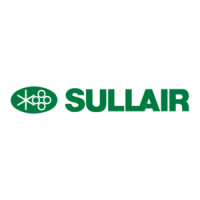SAFETY
®SULLAIR®
3700 Operator’s Manual and Parts List
3
K. DO NOT attempt to operate the compressor in
any classification of hazardous environment
unless the compressor has been specially
designed and manufactured for that duty.
1.5 MOVING PARTS
A. Keep hands, arms and other parts of the body
and also clothing away from couplings, fans and
other moving parts.
B. DO NOT attempt to operate the compressor with
the fan, coupling or other guards removed.
C. Wear snug-fitting clothing and confine long hair
when working around this compressor, especially
when exposed to hot or moving parts.
D. Keep access doors, if any, closed except when
making repairs or adjustments.
E. Make sure all personnel are out of and/or clear of
the compressor prior to attempting to start or
operate it.
F. Disconnect and lock out all power at source and
verify at the compressor that all circuits are de-
energized to minimize the possibility of accidental
start-up, or operation, prior to attempting repairs
or adjustments. This is especially important when
compressors are remotely controlled.
G. Keep hands, feet, floors, controls and walking
surfaces clean and free of fluid, water or other
liquids to minimize the possibility of slips and falls.
1.6 HOT SURFACES, SHARP EDGES
AND SHARP CORNERS
A. Avoid bodily contact with hot fluid, hot coolant, hot
surfaces and sharp edges and corners.
B. Keep all parts of the body away from all points of
air discharge.
C. Wear personal protective equipment including
gloves and head covering when working in, on or
around the compressor.
D. Keep a first aid kit handy. Seek medical
assistance promptly in case of injury. DO NOT
ignore small cuts and burns as they may lead to
infection.
1.7 TOXIC AND IRRITATING
SUBSTANCES
A. DO NOT use air from this compressor for
respiration (breathing) except in full compliance
with OSHA Standards 29 CFR 1910 and/or any
applicable Federal, State or Local codes or
regulations.
B. DO NOT use air line anti-icer systems in air lines
supplying respirators or other breathing air
utilization equipment and DO NOT discharge air
from these systems into unventilated or other
confined areas.
C. Operate the compressor only in open or
adequately ventilated areas.
D. Locate the compressor or provide a remote inlet
so that it is not likely to ingest exhaust fumes or
other toxic, noxious or corrosive fumes or
substances.
E. Coolants and lubricants used in this compressor
are typical of the industry. Care should be taken to
avoid accidental ingestion and/or skin contact. In
the event of ingestion, seek medical treatment
promptly. Wash with soap and water in the event
of skin contact. Consult Material Safety Data
Sheet for information pertaining to fluid of fill.
F. Wear goggles or a full face shield when adding
antifreeze compound to air line anti-icer systems.
G. If air line anti-icer system antifreeze compound
enters the eyes or if fumes irritate the eyes, they
should be washed with large quantities of clean
water for fifteen minutes. A physician, preferably
an eye specialist, should be contacted
immediately.
H. DO NOT store air line anti-icer system antifreeze
compound in confined areas.
A DANGER
INHALATION HAZARD!
Death or serious injury can result from
inhaling compressed air without using
proper safety equipment. See OSHA
standards and/or any applicable Federal,
State, and Local codes, standards and
regulations on safety equipment.
SU_0000006

